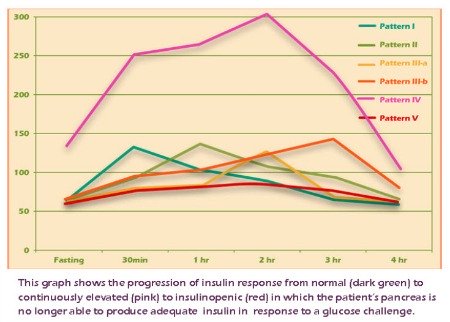PCOS Lab Tests
To aid in a diagnosis of PCOS (polycystic ovary syndrome) or related disorders, a number of laboratory tests may be useful.
Free PCOS Newsletter
Glucose and Insulin Tests
Abnormalities of blood sugar (serum glucose) and insulin are quite common in polycystic ovarian syndrome. There are at least four rather common lab measurements to assess blood sugar status and the possibility of insulin resistance.
- Fasting glucose
- Fasting insulin
- Hemoglobin A1C (HbA1c)
- Glucose tolerance test (GTT)
Click here to find out more about these important tests.
New Insulin Test Helps You Catch PCOS Problems Earlier

A newer lab test has come along, called the glucose tolerance/insulin response test, or GTIR. This test evaluates a sequential pattern between glucose (blood sugar) and insulin. The test has five possible patterns, which may reveal that you have undiagnosed insulin resistance. Since most women with polycystic ovarian syndrome have an issue with insulin resistance, this test is advisable.
Sex Steroid & Reproductive Hormone Tests
- LH (luteinizing hormone)
- FSH (follicle stimulating hormone)
- LH/FSH ratio
- 17alpha-hydroxyprogesterone
- Estrogens
- Testosterone - total and free
- DHEAS (dehydroepiandrosterone sulfate)
Other Useful Tests
These tests are also useful in detecting problems areas associated with polycystic ovary disease.
- SHBG (sex hormone binding globulin)
- Prolactin
- Melatonin
- TSH (thyroid stimulating hormone)
- Complete thyroid profile (TSH, free T4, free T3, rT3, thyroid autoantibodies)
- Metabolic profile
- Complete blood count with differential
- Lipid profile (cholesterol, triglycerides)
- Vitamin D
- Cortisol
Additional tests may be appropriate, depending on your unique medical history and present health status.
Urinary Testing for PCOS
The approach to laboratory evaluation of PCOS varies widely without consensus. It largely remains a diagnosis of exclusion.
Strong evidence of polycystic ovarian syndrome can be obtained from biochemical markers and by ultrasound.
Biochemical markers will measure hyperandrogenism (excessively high male hormones), imbalanced cortisol metabolism, and insulin resistance. An ultrasound will reveal polycystic ovaries.
This data can then guide treatment choices.
A number of labs offer urinary testing to evaluate these hormonal imbalances.
Hormones and related chemicals eliminated in the urine correlate well with tissue levels of these substances and can give the practitioner and patient a window into understanding and dealing with specific imbalances.
One example is 5-alpha reductase, an enzyme involved with androgens such as testosterone and DHT (dihydrotestosterone). These are often elevated and are central to the imbalances associated with this condition.
In the ovary, the excess androgen production is stimulated by insulin.
Insulin resistance further amplifies this hormone imbalance and is associated with worsening of ovarian function.
Androgen excess affects the adrenal glands, causing them to release more cortisol and thus increasing blood sugar and worsening blood sugar imbalances found in women with polycystic ovary disease.
Further, urinary testing can determine tissue levels of cortisol, testosterone, androsterone, as well as female hormones estrogen and progesterone. These may be more accurate and specific than blood tests for these hormones.
Comprehensive urinary steroid hormone testing can identify specific hormone and enzyme levels which help us understand the specific imbalances in each woman with PCOS as well as guiding specific treatment choices to restore balance to the endocrine system.
If you are working with a naturopathic doctor or other healthcare provider, ask them if this type of testing may be right for you.
Carl Hangee-Bauer, ND, Lac
Clinic Director, San Francisco Natural Medicine
Get Answers to your Questions about
- Fertility
- Weight Control
- Hair Loss
- Stress
- Unwanted Hair
- Acne...and more!
FREE PCOS Report
and Newsletter

Your email is safe with us. We respect your privacy, and you may unsubscribe at any time.
Recent Articles
-
PCOS Long Journey to The Happy End
Apr 30, 18 07:24 PM
Hi Girls, Maybe my story will have one day a good end but I am not there yet. Until I was 31 years old I lived my dream, having lovely husband, good -
PCOS and Miscarriage
Apr 17, 18 04:03 PM
Proper diet and natural supplements can help the body maintain a pregnancy through successful delivery.
-
How to Deal with PCOS and Stress
Apr 04, 18 04:19 PM
Your body has a natural capacity to heal itself if you provide it with the necessary tools.





